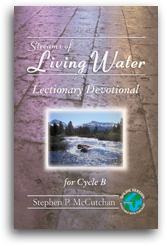SermonStudio
Proper 12
Devotional
Streams of Living Water
Lectionary Devotional for Cycle B
2 Samuel 11:1-15
So David sent messengers to get her, and she came to him, and he lay with her. (Now she was purifying herself after her period.)
-- 2 Samuel 11:4a
So David sent messengers to get her, and she came to him, and he lay with her. (Now she was purifying herself after her period.)
-- 2 Samuel 11:4a


